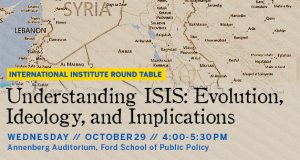Presented By: International Institute
II Round Table. Understanding ISIS: Evolution, Ideology, and Implications

ISIS has gained increasing media attention and alarmed world leaders since June 2014 when it seized control of large swaths of territory in northeastern Syria and western Iraq, includingIraq's second largest city Mosul, and declared the establishment of an Islamic caliphate. But this Islamist extremist group (also known as ISIL and Islamic State) has been growing in strength and popularity for several years, and the roots of its grievances are centuries old. This II Round Table brings together four experts to shed light on different aspects of ISIS: its origins, ideology, popular support, and impact on the international system.
Panel:
Moderator: Pauline Jones Luong, Director International Institute; Political Science (U-M)
"Sunni Economic and Political Grievances"
Juan Cole, Director CMENAS; History (U-M)
"Contemporary Radical Discourse and the Killing of Civilians: al-Qaeda and ISIS as Case Studies"
Mohammad Khalil, Religious Studies (MSU)
"ISIS in the Western Order: How Does it ‘Fit’ and What are the Challenges?"
James Morrow, Political Science (U-M)
"Iraqi Views about Sectarian Identity and Political Islam: Findings from Surveys in 2004, 2006, 2011 and 2013"
Mark Tessler, Political Science (U-M)
Panel:
Moderator: Pauline Jones Luong, Director International Institute; Political Science (U-M)
"Sunni Economic and Political Grievances"
Juan Cole, Director CMENAS; History (U-M)
"Contemporary Radical Discourse and the Killing of Civilians: al-Qaeda and ISIS as Case Studies"
Mohammad Khalil, Religious Studies (MSU)
"ISIS in the Western Order: How Does it ‘Fit’ and What are the Challenges?"
James Morrow, Political Science (U-M)
"Iraqi Views about Sectarian Identity and Political Islam: Findings from Surveys in 2004, 2006, 2011 and 2013"
Mark Tessler, Political Science (U-M)